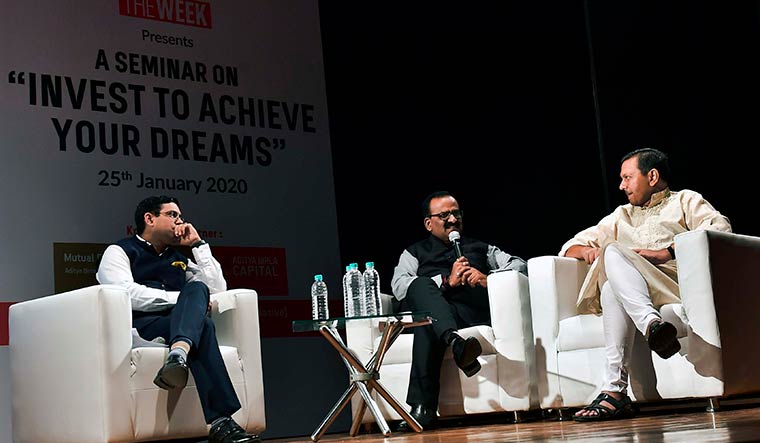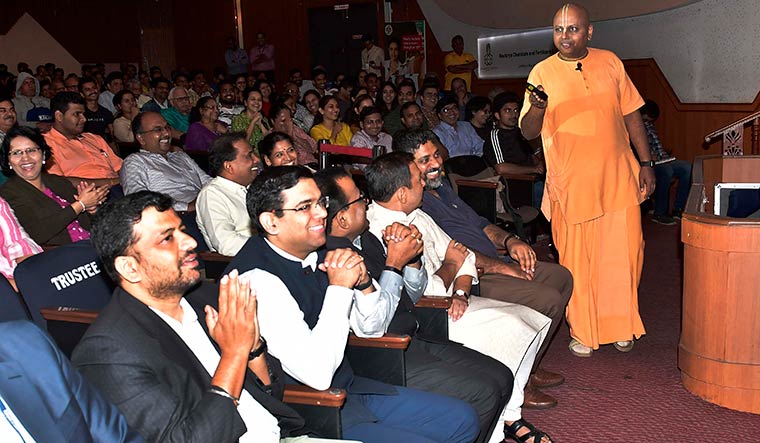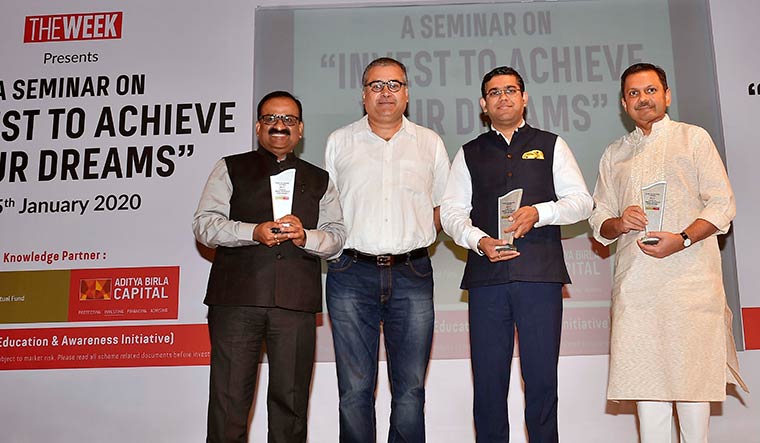We live in difficult times—expenses are rising, retail inflation rate touched 7.35 per cent in December. At the same time, interest rates are falling. Between February and October, the Reserve Bank of India cut repo rate by 135 basis points in a bid to give a lift to the economy. Equity markets have been volatile. Even as the benchmark indices have hit new highs over the past few months, people who have invested in small- and mid-caps have earned hardly anything in the past couple of years. In such a scenario, how do you plan for your dreams? How do you secure your family’s future?
In a seminar organised by THE WEEK and Aditya Birla Sun Life Mutual Fund in Mumbai, experts shared tips and ideas on the need for financial planning and how one should plan for the good times and bad times.
The annual savings rate of Indians has typically been around 30 per cent. Yet, barely about 2 per cent of the people invest in equity or equity-linked instruments. Traditionally, Indians preferred investing in gold or property. Over the past few years, however, residential real estate market has been down, and prior to 2019, gold delivered subdued returns for several years. As India does not have a social security system, planning to ensure that the financial goals are achieved is extremely crucial.
It is necessary to write down your goals first, said K.S. Rao, head of investor education and distribution development at Aditya Birla Sun Life Mutual Fund. “There is a study which says that if I have a goal and I have not written it down, there is an 80 per cent possibility that I will not accomplish it. If I have a goal and I write it down, there is an 80 per cent possibility that I will accomplish it,” he said.
It is also important that you share your goals with family members. “Financial planning is a joint activity,” said certified financial planner Gaurav Mashruwala. “I encourage couples to go on financial date. Go on a date with your spouse every three months and spend time keeping yourself abreast of your finances.” It is crucial that couples periodically take stock of their investments and check if there are adequate funds to achieve near-term goals, and ensure that their KYC details are up to date and nomination is done to ensure that they are prepared for any future uncertainties, said Mashruwala.
Once the goals are clear, one should think about the time one has to achieve a particular goal and assess the risk appetite as well. Risk-averse investors tend to save money in bank deposits. But, saving does not necessarily mean investing. Also, given that interest rates are falling and inflation is rising, and such deposits are taxable, most of these investors would hardly make any real returns. “There is a big difference between savings and investment. Savings will put money together. Investment makes the money work for you in a way that you end up making money much more than inflation rate,” said Vaibhav Chugh, zonal head (west), retail sales, Aditya Birla Sun Life AMC.
That is where mutual funds come into the picture. They offer multiple choices based on one’s risk appetite and time horizon. “Today, the mutual fund industry has grown in a way that if you have a requirement for one day, or you have a 100-year goal, you will have products from mutual funds,” said Chugh.
For risk-averse investors, liquid funds could be a good alternative to bank deposits for short-term goals or to build an emergency corpus. Liquid funds invest in safe short-term instruments like call money (a very short-term bank loan), treasury bills and government securities.
People who have a 2- to 3-year investment horizon and do not want the ups and downs associated with equity investments can explore balance funds as a category, where the money is invested in a combination of equity and debt. “Over a period, it keeps your money secure, but at the same time, it also counters the biggest villain of our life—inflation,” said Chugh.
For long-term investors, there are many different types of mutual funds, some investing in large-caps, some in mid-caps or small-caps, and some investing a mix of securities. Experts say one needs to remain focused through the duration of investment and not be swayed by external developments like market movement and economic growth. “If our goals, responsibilities and dreams do not change based on external conditions, why are we using those external parameters to procrastinate our decisions? That is the basic mistake,” said Mashruwala.
Life coach Gaur Gopal Das, who also spoke at the event, stressed on the need for investing in “building ourselves”. People should identify things that are not under one’s control, or challenges, and not allow them to hurt their lives. “The takeoff and the landing are not in our hands at all. During the journey there is a lot of turbulence as well. That turbulence is not in our control. Your journey is not defined by the takeoff, or the landing or the turbulence; they all are beyond you. Your journey depends on the choices that you make and that is completely in your control. Life is exactly the same,” said Das.
Das noted that just like markets have its ups and downs, in life, too, there will be challenges. “Identify the constants in your challenges,” he said. “If you cannot identify what is unchangeable, you will keep putting your effort to change the unchangeable and only keep hurting yourself.”




